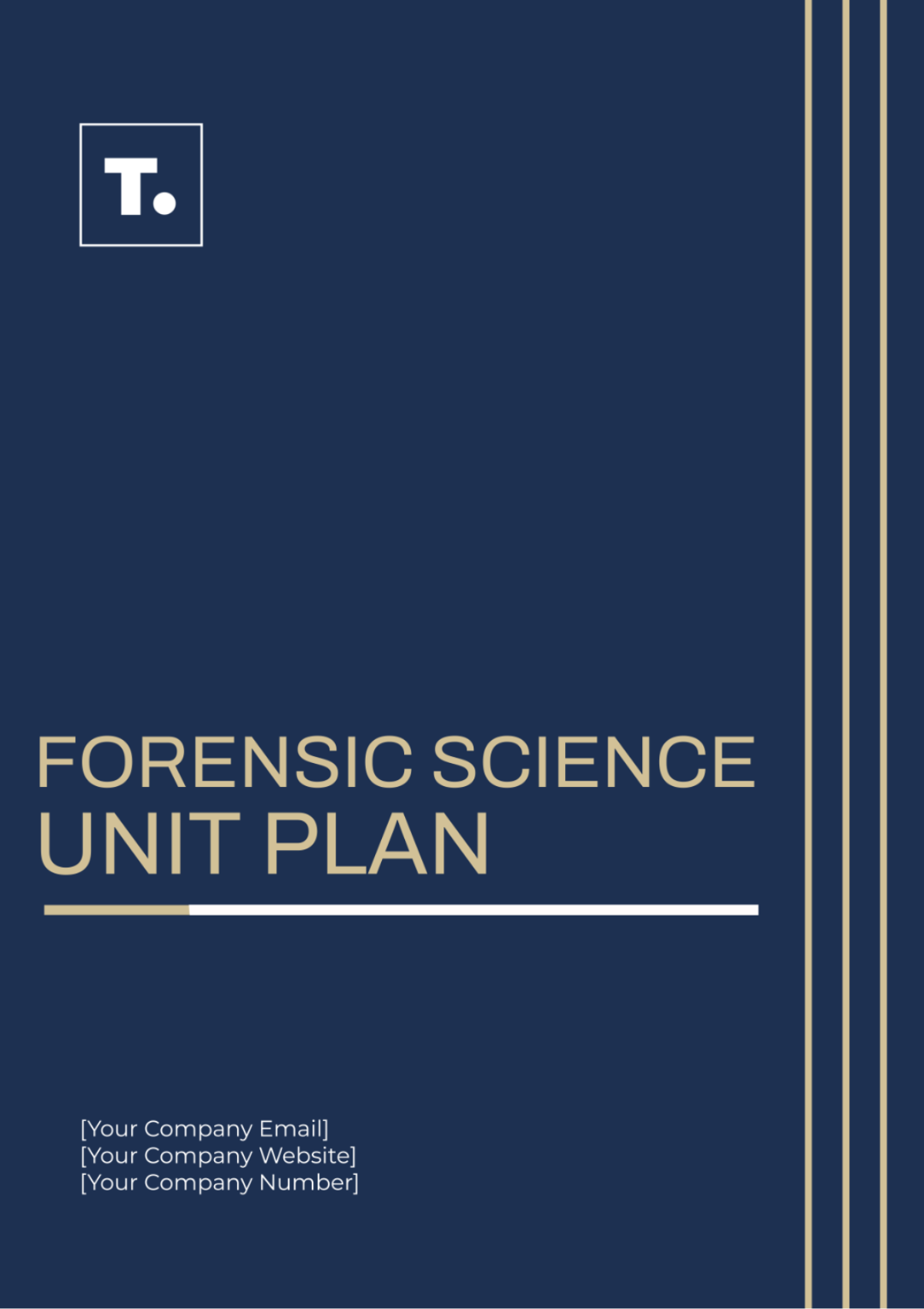Forensic Science Unit Plan
Prepared By: | [Your Name] |
Course Title: | Forensic Science |
Grade Level: | [Grade Level] |
Unit Duration: | [Number of Weeks/Days] |
Date: | [DATE] |
I. Unit Overview
Unit Title: Introduction to Forensic Science
Unit Description:
This unit introduces students to the fundamental principles and practices of forensic science. Students will explore various forensic disciplines, the role of forensic scientists, and the application of scientific methods to solve crimes.
Unit Objectives:
Understand the history and evolution of forensic science.
Identify and describe the various branches of forensic science.
Apply scientific methods to analyze crime scenes and evidence.
Develop critical thinking and problem-solving skills through forensic investigations.
Demonstrate knowledge of forensic science in written and practical assessments.
II. Lesson Plans
A. Lesson 1: Introduction to Forensic Science
Objective:
Students will gain an understanding of the history and significance of forensic science.
Activities:
Lecture on the history of forensic science
Discussion on the role and importance of forensic scientists
Group activity: Research and present a famous forensic case
Assessment:
Participation in discussions and group presentations.
B. Lesson 2: Crime Scene Investigation
Objective:
Students will learn the procedures for securing and analyzing a crime scene.
Activities:
Demonstration of crime scene procedures
Hands-on activity: Simulated crime scene investigation
Group discussion: Crime scene management
Assessment:
Crime scene reports and participation in hands-on activities.
C. Lesson 3: Fingerprint Analysis
Objective:
Students will understand the principles of fingerprint analysis and its applications.
Activities:
Lecture on fingerprint patterns and identification techniques
Lab activity: Fingerprint collection and analysis
Individual assignment: Case study on fingerprint evidence
Assessment:
Lab reports and case study submissions.
D. Lesson 4: DNA Analysis
Objective:
Students will learn about DNA profiling and its use in forensic science.
Activities:
Presentation on DNA structure and profiling techniques
Lab activity: DNA extraction and analysis
Discussion: Ethical considerations in DNA evidence
Assessment:
Lab reports and participation in discussions.
E. Lesson 5: Forensic Toxicology
Objective:
Students will explore the role of toxicology in forensic investigations.
Activities:
Lecture on toxicology principles and methods
Case study analysis: Poisoning cases
Group activity: Toxicology report preparation
Assessment:
Case study analysis and toxicology reports.
III. Assessments
A. Formative Assessments
Daily participation in discussions and activities
Lab reports and hands-on activity results
Group presentations and collaborative projects
B. Summative Assessments
Unit test covering all major topics
Final project: Detailed forensic case analysis
Written report and oral presentation on the final project
IV. Resources
A. Textbooks
"Forensic Science: Fundamentals and Investigations" by Anthony J. Bertino
B. Online Resources
National Institute of Justice: www.nij.gov
Forensic Science Simplified: www.forensicsciencesimplified.org
C. Materials
Fingerprint kits
DNA extraction kits
Crime scene investigation tools (evidence markers, tape, gloves, etc.)
V. Conclusion
The Forensic Science Unit has provided students with a comprehensive introduction to the fascinating world of forensic science. Through a blend of theoretical knowledge and practical application, students have gained an understanding of the critical role forensic science plays in the criminal justice system.
A. Key Takeaways
Historical Perspective: Students explored the evolution of forensic science and its impact on modern investigative techniques.
Crime Scene Investigation: Hands-on activities enabled students to apply proper procedures for securing and analyzing crime scenes.
Fingerprint and DNA Analysis: Practical lab sessions helped students understand the intricacies of fingerprinting and DNA profiling.
Forensic Toxicology: The study of toxicology highlighted the importance of chemical analysis in solving poisoning cases.
B. Skills Developed
Critical thinking and problem-solving
Attention to detail in analyzing evidence
Teamwork and collaboration in group projects
Effective communication through written reports and presentations
By the end of this unit, students have not only acquired foundational knowledge in forensic science but also developed essential skills that are applicable beyond the classroom. The integration of various forensic disciplines has provided a holistic view of how scientific methods contribute to solving crimes and ensuring justice.
C. Future Directions
Students are encouraged to continue exploring the field of forensic science through advanced courses, extracurricular activities, and potential career paths. The knowledge and skills gained from this unit will serve as a solid foundation for future studies and professional endeavors in forensic science and related fields.
VI. Additional Notes
Classroom Policies:
Attendance and participation are crucial for success in this unit.
Late submissions will be penalized unless prior arrangements are made.
All lab safety protocols must be followed strictly.
Contact Information: For any questions or further assistance, please contact [Your Name] at [Your Email].

















































